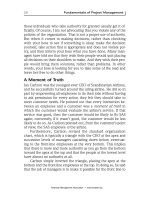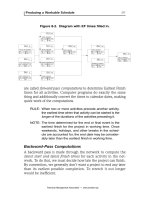Exploring management 6th by schermerhornch17
Bạn đang xem bản rút gọn của tài liệu. Xem và tải ngay bản đầy đủ của tài liệu tại đây (376.43 KB, 31 trang )
Exploring Management
John R. Schermerhorn Jr. and Daniel G. Bachrach
Sixth Edition
Chapter 17
Globalization and International Business
The International Labour Organization reports
there are 215 million child laborers worldwide;
115 million of them work in hazardous
conditions.
Copyright ©2018 John Wiley & Sons, Inc.
2
Your Chapter 17 Takeaways
• Discuss ways that globalization affects international business (17.1)
• Understand what global corporations are and how they work (17.2)
Copyright ©2018 John Wiley & Sons, Inc.
3
GLOBALIZATION 17.1
Takeaway 17.1 - Answers to come
• Globalization increases interdependence of the world’s economies.
• Globalization creates international business opportunities.
• Global sourcing is a common international business activity.
• Export/import, licensing, and franchising are market entry forms of international business.
• Joint ventures and wholly owned subsidiaries are direct investment forms of international
business.
• International business is complicated by different legal and political systems.
• International businesses deal with regional economic alliances
Copyright ©2018 John Wiley & Sons, Inc.
4
GLOBALIZATION 17.1
Travels of a T-Shirt Globally
Figure 17.1 How Does a T-Shirt Travel Through the World’s Global Economy?
Copyright ©2018 John Wiley & Sons, Inc.
5
GLOBALIZATION 17.1
Globalization Increases Interdependence
• Global economy
• Labor and resource supplies, capital and product markets, and
business competition are worldwide in scope
• Globalization
• Process of growing interdependence of global economies
Copyright ©2018 John Wiley & Sons, Inc.
6
GLOBALIZATION 17.1
World Economies
• Insourcing
• Domestic jobs are created by foreign employers
• Outsourcing
• Jobs are shifted to foreign locations to take advantage of lower wages,
infrastructure, educated workforce or government support
Copyright ©2018 John Wiley & Sons, Inc.
7
GLOBALIZATION 17.1
International Business Opportunities
Globalization Creates International Business Opportunities
•
Conducts transaction across international boundaries
Why Businesses Go Global
Profits—gain profits through expanded operations.
Customers—enter new markets to gain customers.
Suppliers—get access to products, services, and materials.
Labor—hire low-cost, talented workers.
Capital—get access to financial resources
Risk—spread assets among multiple countries.
Economic development—help to make the world a better place
Copyright ©2018 John Wiley & Sons, Inc.
8
GLOBALIZATION 17.1
Global Sourcing
•
•
•
A business purchases materials, manufacturing, or services from around the world
A global supply chain is a network of a firm’s outsourcing suppliers and contractors
Reshoring shifts jobs back from foreign locations to domestic locations
Copyright ©2018 John Wiley & Sons, Inc.
9
GLOBALIZATION 17.1
Market Entry Forms of International Business
•
•
Mainstay and Market Entry Approaches
Direct Investment Approaches
Copyright ©2018 John Wiley & Sons, Inc.
10
GLOBALIZATION 17.1
Direct Investment Strategies
•
Joint Venture
•
•
Global Strategic Alliance
•
•
Cooperative partnership to achieve task that would be difficult for partners alone
Foreign Subsidiary
•
•
co-ownership arrangement in which the foreign and local business jointly operate the new business
operation completely owned and controlled by a foreign firm
Greenfield Venture
•
subsidiary established after firm has experience in joint ventures
Copyright ©2018 John Wiley & Sons, Inc.
11
GLOBALIZATION 17.1
Choosing a Joint Venture Partner
• Familiar with your firm’s major business
• Employs a strong local workforce
• Values its customers and employees
• Has strong local market for its own products
• Has record of good management
• Has good profit potential
• Has sound financial standing
• Has reputation for ethical decision making
• Has reputation for socially responsible practices
Copyright ©2018 John Wiley & Sons, Inc.
12
GLOBALIZATION 17.1
Legal and Political Systems
• International business is complicated by different legal and political systems
• Common legal problems faced:
• Incorporation practices
• Business ownership
• Negotiation and implementation of contracts
• Foreign currency exchange
• Protection of intellectual property
Copyright ©2018 John Wiley & Sons, Inc.
13
GLOBALIZATION 17.1
Legal and Political Issues
• Tariffs
• Taxes placed on imports
•
Nontariff barriers
• Discourage imports in nontax ways like quotas and government import
restrictions
• Protectionism
• Tariffs, subsidies, and other tactics that give advantages to domestic
producers
Copyright ©2018 John Wiley & Sons, Inc.
14
GLOBALIZATION 17.1
Legal and Political Issues
• World Trade Organization
• Global institution to promote free trade and open markets around the
world
• Membership of 171 countries
• Most Favored Nation status
• www.wto.org
Copyright ©2018 John Wiley & Sons, Inc.
15
Globalization 17.1
Regional Economic Alliances
•
NAFTA is the North American Free Trade Agreement linking Canada, the United States, and Mexico in an
economic alliance.
•
The EU or European Union is a political and economic alliance of 28 European countries.
•
APEC is the Asia-Pacific Economic Cooperation that links 21 nations to promote free trade and investment
in the Pacific region.
•
SADC is the Southern Africa Development Community that links 14 southern African countries in trade and
economic development efforts.
Copyright ©2018 John Wiley & Sons, Inc.
16
GLOBALIZATION 17.1
Study Guide for Takeaway 17.1
Rapid Review:
•
The forces of globalization create international business opportunities to pursue profits, customers, capital, and
low-cost suppliers and labor in different countries.
•
The least costly ways of doing business internationally are to use global sourcing, exporting and importing, and
licensing and franchising.
•
Direct investment strategies to establish joint ventures or wholly owned subsidiaries in foreign countries
represent substantial commitments to international operations.
•
Environmental differences, particularly in legal and political systems, can complicate international business
activities.
•
The World Trade Organization (WTO) is a global institution established to promote free trade and open markets
around the world.
•
Regional economic alliances link member nations for cooperation in economic and trade development.
Copyright ©2018 John Wiley & Sons, Inc.
17
GLOBALIZATION 17.1
Study Guide for Takeaway 17.1
Questions for Discussion:
1.
Why would a government want to prohibit a foreign firm from owning more than 49% of
a local joint venture?
2.
Are joint ventures worth the risk of being taken advantage of by foreign partners, as with
GM’s “Chery” case in China?
3.
What aspects of the U.S. legal environment might prove complicated for a Russian firm
starting new operations in the United States?
Copyright ©2018 John Wiley & Sons, Inc.
18
GLOBALIZATION 17.1
Be Sure You Can…for Takeaway 17.1
•
•
•
explain how globalization impacts our lives.
•
•
discuss how differences in legal environments can affect businesses operating internationally
list five reasons that companies pursue international business opportunities.
describe and give examples of how firms do international business by global sourcing,
exporting/importing, franchising/licensing, joint ventures, and foreign subsidiaries
explain the purpose of the World Trade Organization
Copyright ©2018 John Wiley & Sons, Inc.
19
GLOBAL CORPORATIONS 17.2
Takeaway 17.2 – answers to come
•
Global corporations or MNCs do substantial business in many countries.
•
The actions of global corporations can be controversial Managers of global corporations face a variety of
ethical challenges.
•
Planning and controlling are complicated in global corporations.
•
Organizing can be difficult in global corporations.
•
Leading is challenging in global corporations.
Copyright ©2018 John Wiley & Sons, Inc.
20
GLOBAL CORPORATIONS 17.2
Global Corporations
• Global corporations and also known as Multinational corporations (MNC)
• Extensive foreign operations in more than many foreign countries
• Derive a substantial portion of sales and profits from international sources
• Transnational corporations
• Operate without one national home
Copyright ©2018 John Wiley & Sons, Inc.
21
GLOBAL CORPORATIONS 17.2
Issues
Figure 17.2 What Can Go Right and Wrong in Relationships Between Global Corporations and Their Host
Countries?
Copyright ©2018 John Wiley & Sons, Inc.
22
GLOBAL CORPORATIONS 17.2
Ethical Challenges
• Corruption
• Illegal practices
•
Foreign Corrupt Practices Act
•
•
•
Prevents bribes, gifts to foreign officials in return for business favors
Sweatshops
•
•
U.S. legal standards apply to companies when operating in foreign countries
Employees work long hours in poor or unsafe conditions
Child labor
•
Full-time employment of children
Copyright ©2018 John Wiley & Sons, Inc.
23
GLOBAL CORPORATIONS17.2
Planning and Controlling Challenges
• Political risk
• Risk of loss because of political instability in foreign country
• Political risk analysis
• Forecasts how political events may impact foreign investments
• Currency risk
• Possible loss because of
fluctuating exchange rates
Copyright ©2018 John Wiley & Sons, Inc.
24
GLOBAL CORPORATIONS 17.2
Planning and Controlling Challenges
• Scenario 1: Weak dollar
• 1 $US = 0.75 euro
• Euro sales = €100,000
• U.S. take-home revenue = $133,000
• Scenario 2: Strong dollar
• 1 $US = 1.25 euros
• Euro sales = €100,000
• U.S. take-home revenue = $80,000
Copyright ©2018 John Wiley & Sons, Inc.
25









